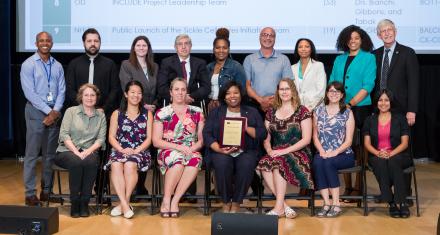
The NINDS is committed to the development of a biomedical research workforce that is representative of the diversity in American society. NINDS seeks to promote diversity in all of its training and research programs and to enhance the participation of underrepresented groups.
Director's Statement

For the hundreds of thousands of people with neurological disorders and stroke, NINDS-funded investigators are their hope. The problems are hard, and we need more powerful tools and greater fundamental knowledge of the nervous system to solve them. NINDS has long recognized that achieving diversity in the neuroscience and biomedical research workforce is critical to realize our research goals. Enhancing the diversity and inclusiveness of our workplace and the broader neuroscience and biomedical research workforce will enhance our overall creativity and ability to adapt. All of neuroscience benefits if we can engage all segments of society in our efforts to reduce the burden of illness due to neurological disorders and stroke.
The Office of Programs to Enhance Neuroscience Workforce Diversity coordinates NINDS’s diversity activities, spanning the training pipeline from innovative neuroscience education outreach (grades K-12) to funding opportunities and important mentoring networks across critical career transition points (from undergraduate up to junior faculty). In addition, our summer program efforts have been successful in bringing diverse students to intramural NIH laboratories for research experiences.
Reinvigorated by a special NINDS report(pdf, 594 KB) evaluating our efforts, NINDS encourages activities to support diversity by all staff, throughout all corners of the Institute. To foster broader internal input and involvement, the Diversity Working Group (DWG) composed of program directors representing every scientific portfolio at NINDS, meets monthly to discuss issues related to the institute’s diversity efforts, and to implement strategies for enhancing diversity in the neuroscience workforce.
Diversity is not the problem, it is the solution!
Enhancing Diversity
As the U.S. population becomes increasingly diverse, reflection of that diversity among the biomedical research workforce is vital to our science enterprise and the NIH research mission. There are compelling reasons to promote a diverse workforce and enhance participation by underrepresented groups. Advancing diversity through NINDS individual and institutional programs is expected to produce a number of tangible and overlapping benefits:
- The recruitment of the most talented researchers from all groups;
- An improvement in the quality of the educational training environment;
- A balanced perspective in setting research priorities;
- An improved capacity to recruit subjects from diverse backgrounds into clinical research protocols;
- An improved capacity to address health disparities.
Extramural Research Programs
The NINDS supports diverse individuals through general training programs as well as with targeted efforts to enhance the number of scientists from diverse population groups who are prepared to pursue careers in neuroscience research. These funding opportunities include: fellowships for graduate students, funds added to an existing grant for mentoring individuals across high school to faculty stage (diversity supplements), institutional research education awards to enhance professional development and career advancement of diverse researchers and career development awards to assist transition to independent research careers. The strategy to enhance the diversity of neuroscience researchers at NINDS includes interventions that connect programs across critical transition points and activities/workshops to assist trainees with the professional development skills and scientific networks to achieve their goals.
